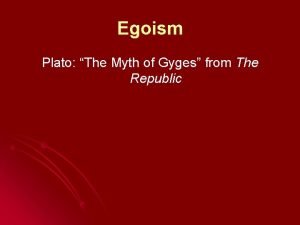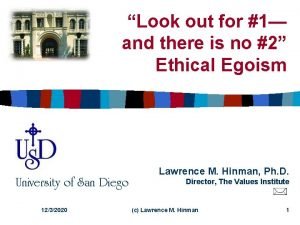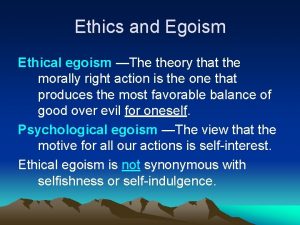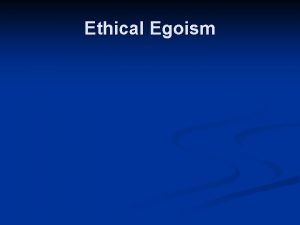Chapter 3 The Challenge of Egoism Psychological Egoism










- Slides: 10

Chapter 3 The Challenge of Egoism

Psychological Egoism • This view maintains that, despite appearances to the contrary: – We actually behave self-interestedly • Does not maintain that despite appearances to the contrary: – Some of us are significantly motivated by selfinterest © 2013 Pearson Education, Inc. All rights reserved.

Ethical Egoism • Individual Ethical Egoism – Maintains that everyone ought to do what is in the overall self-interest of one individual – Justification for giving only Gladys’s interests this status • No relational characteristic • No characteristic shared with others © 2013 Pearson Education, Inc. All rights reserved.

Ethical Egoism • No unique characteristic • Possessing unique traits • Not claiming special status – Is an indefensible position • Universal Ethical Egoism – Maintains that everyone ought to do what is in his or her own overall self-interest © 2013 Pearson Education, Inc. All rights reserved.

Appealing to Publicity • Universal Ethical Egoism has been forcefully criticized by: – Contemporary philosopher, Christine Korsgaard, among others: • For failing to meet a “publicity requirement” that is satisfied by morality • Seymour and Universal Ethical Egoism © 2013 Pearson Education, Inc. All rights reserved.

Paralleling Egoism and Racism • Philosopher James Rachels offered an argument that he thinks: – “Comes closest to an outright refutation of Ethical Egoism” • Egoist does not provide a good reason: – Why everyone should support the egoist’s own interests over everyone else’s © 2013 Pearson Education, Inc. All rights reserved.

Appealing to Consistency • Kurt Baier among others tries to show that: – Universal Ethical Egoism is fundamentally inconsistent • Defenders of Universal Ethical Egoism stress we should have little difficulty: – Understanding the analogous use of “ought” by the Universal Ethical Egoist © 2013 Pearson Education, Inc. All rights reserved.

Meeting the Challenge of Universal Ethical Egoism • From Rationality to Morality – Principle of egoism: • Each person ought to do what best serves his or her overall self-interest – Principle of altruism: • Each person ought to do what best serves the overall interest of others © 2013 Pearson Education, Inc. All rights reserved.

Meeting the Challenge of Universal Ethical Egoism – Cast the conflict not as a conflict between selfinterested reasons and moral reasons: • But instead as a conflict between self-interested reasons and altruistic reasons • Lifeboat Cases – Like when two individuals are stranded in a lifeboat & only enough resources for one © 2013 Pearson Education, Inc. All rights reserved.

Morality as Compromise • Morality can be viewed as a nonarbitrary compromise: – Between self-interested and altruistic reasons • A nonquestion-begging argument favoring morality over egoism – In this way justifies morality over egoism • Morality as Compromise in practice © 2013 Pearson Education, Inc. All rights reserved.
















